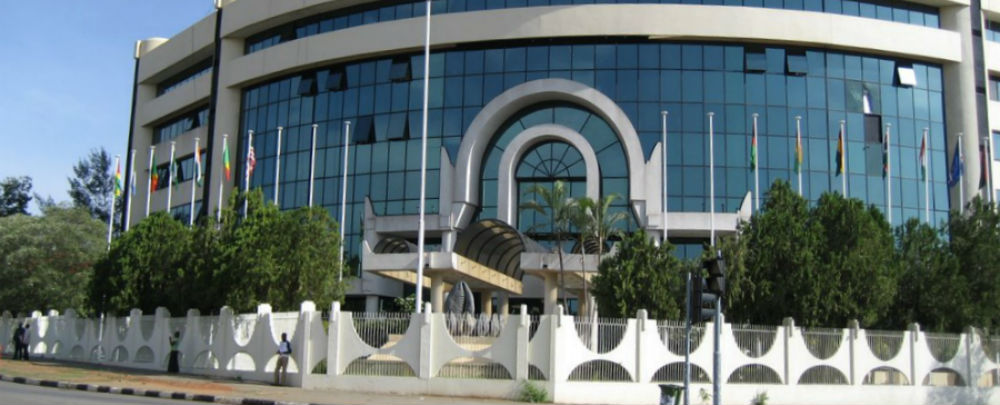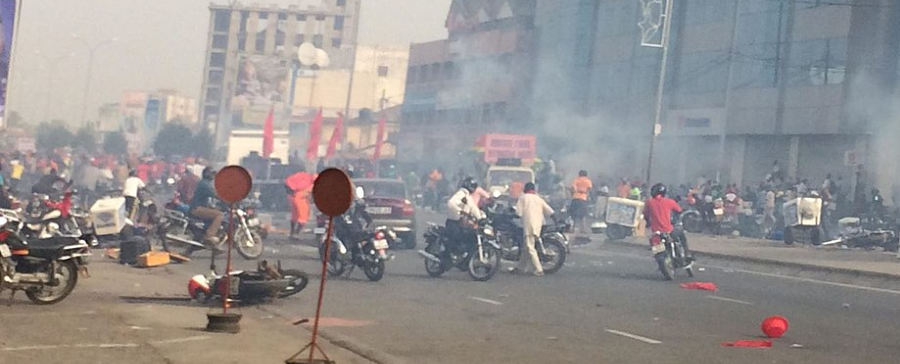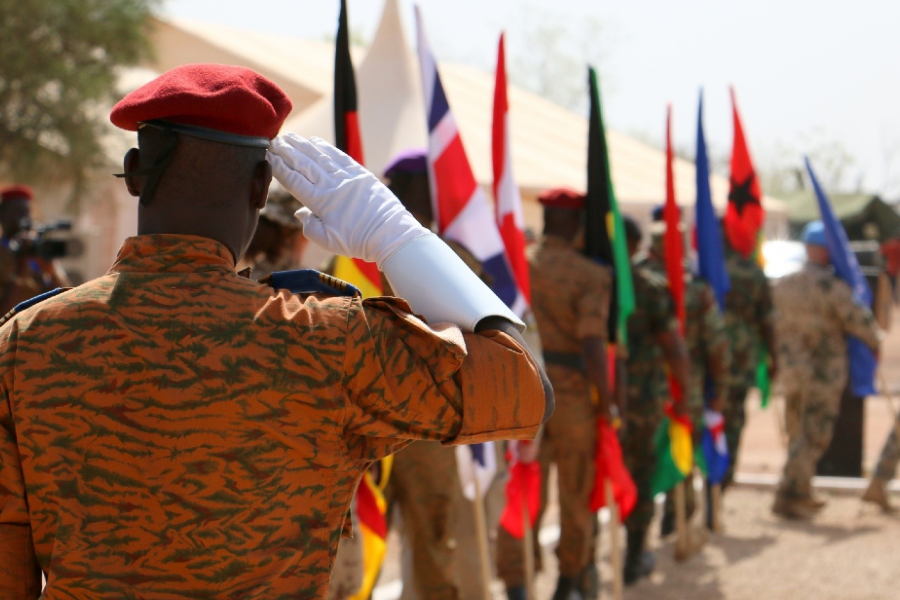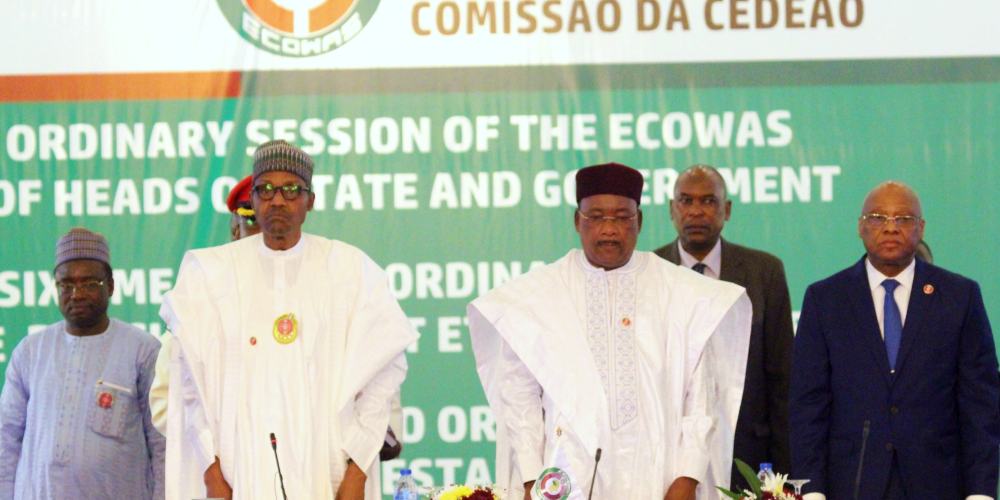
ECOWAS headquarters in Abuja, Nigeria.
Long a leader in advancing democratic norms in Africa, the Economic Community of West African States (ECOWAS) faces a growing challenge of democratic backsliding. In Togo’s 2020 presidential elections, President Faure Gnassingbé implausibly claimed a first round victory (and fourth term in office) despite widespread popular discontent that had seen massive protests over the previous 2 years.
In Guinea, 82-year-old President Alpha Condé has advanced a constitutional referendum that proposes to extend the length of presidential terms from 5 years to 6. The expectation is that Condé would use any such amendment as a pretext to justify a bid for a third term, despite civil society organizations having repeatedly organized protests against any constitutional changes regarding term limits. In December 2019, an estimated 1 million protesters took to the streets.
In Benin, the vanguard of Africa’s multiparty democracy movement in the 1990s, opposition parties boycotted the April 2019 parliamentary elections, complaining of vote rigging and harsh measures undertaken by security services, including making arbitrary arrests and firing on protesters. Only two parties were allowed to run—both allied to President Talon—and just 27 percent of the population turned out to vote. Even Talon conceded that the vote undermined the country’s democracy but said he could not “interfere” with the country’s laws—laws engineered by his government to result in Talon’s win.

A confrontation with police during an opposition protest in, Lomé, Togo, on December 28, 2017. (Photo: VOA/Kayi Lawson)
In each of these cases, to varying degrees, ECOWAS has largely stood by as essential democratic processes were dismantled or disregarded. This passivity has transpired despite ECOWAS’s path-breaking 2001 Protocol on Democracy and Good Governance that enshrines democratic norms as the standard for the region and sets out collective responsibilities for regional members to uphold democratic processes when these come under attack. ECOWAS’s inaction, in turn, opens the door to other leaders who may be tempted to avert limits on executive power. This is ironic since in 2017, 14 of the 15 ECOWAS members were democratic-leaning.
Given the greater propensity of authoritarian governments for political crisis, corruption, widening inequality, and conflict, ECOWAS’ passivity in the face of democratic backsliding can be expected to lead to greater instability in the region. This would reverse the significant security gains made in the region since the 1990s (coinciding with the adoption of democratic systems). Across Africa, one-third of countries where leaders have evaded term limits are facing armed conflict, triple the rate of countries that have upheld terms limits.
A Hard-Earned Legacy of Upholding Democracy
ECOWAS’ inaction in the face of democratic reversals is especially noteworthy because the regional body had established a reputation over the previous two decades as the leader across Africa’s regional organizations in upholding democratic principles.
When Gambian President Yahya Jammeh refused to leave office after losing the December 2016 election, ECOWAS organized regional leaders to launch high-level talks to persuade him to step down. When they failed, ECOWAS expelled Jammeh from the organization and threatened a military operation that led to his exit. “Operation Restore Democracy,” as it was called, invoked Article 45 of ECOWAS’ Protocol on Democracy and Good Governance that authorizes ECOWAS intervention if “democracy is abruptly brought to an end by any means or where there is massive violation of human rights.”
ECOWAS first demonstrated its willingness to confront destabilizing governance in the region in 1990, when it deployed a 3,000-strong force to Liberia to end the civil war and facilitate the creation of a democratic government. In 2003, it launched a diplomatic process to persuade then President Charles Taylor to leave office since his complicity in war crimes would compromise the peace and reconciliation process. After months of maneuvering, he eventually reluctantly handed power to an interim leader under the close watch of ECOWAS forces.

A soldier from Burkina Faso saluting during the Western Accord 16 joint military exercise. (Photo: US Army/Staff Sgt. Candace Mundt)
In Côte d’Ivoire, ECOWAS used a similar template. The country was plunged into crisis when then President Laurent Gbagbo refused to vacate the presidency after losing the October 2010 elections to Alassane Ouattara. ECOWAS refused to recognize Gbagbo as president, threatened military force, and dismissed a Constitutional Court ruling that overturned the results in his favor. ECOWAS even rejected an African Union (AU) compromise proposal to establish a unity government that would have allowed Gbagbo to remain in power.
In September 2015, ECOWAS sent a high-level delegation led by Senegalese President Macky Sall to Ouagadougou after military leaders loyal to ousted President Blaise Compaoré mounted a coup against a civilian transitional government. This mediation led the coup leaders to stand down, enabling the resumption of the democratic process.
These and other ECOWAS engagements to uphold democratic norms reinforced the shift toward democracy in the region. In fact, in 2015, ECOWAS broke new ground by proposing a ban on third terms among its member states. Paradoxically, it would have been adopted if it were not for the objections of Jammeh, who had been in power nearly 20 years at that point, and Faure Gnassingbé, whose family has ruled Togo for more than 50 years.
ECOWAS’s Recent Ambivalence
To be clear, ECOWAS has not historically always acted consistently or decisively when democratic practices were threatened. Furthermore, ECOWAS continues to try and uphold democratic processes in certain contexts, such as its sustained engagement in Guinea-Bissau. Nonetheless, ECOWAS’ unresponsiveness in multiple recent cases of democratic backsliding reveals a pattern of growing docility. What factors are contributing to this divergence?
Shifting Political Will. Much of ECOWAS’ engagements in the region have depended on the commitment of a cadre of ECOWAS leaders.
In Gambia in 2016, Senegal’s President Macky Sall, Ghanaian President Nana Akufo-Addo, and Liberia’s Ellen Johnson Sirleaf all worked closely to build consensus within ECOWAS to insist that Jammeh step down after he lost the election.
Following the military coup in Mali in 2012, ECOWAS—led by Alassane Ouattara from Côte d’Ivoire, as well as the presidents of Benin, Burkina Faso, Liberia, and Niger—refused to recognize the coup leaders, imposed travel bans on coup leaders, froze the nation’s assets, and closed borders between Mali and member states.
In 2009, ECOWAS refused to recognize Nigerien President Mamadou Tandja’s legitimacy after the expiration of his second term, despite Tandja’s having organized a disputed referendum and election in support of a third term.

Nigerian President Muhammadu Buhari and President of the ECOWAS Commission Jean-Claude Kass Brou at the opening of 56th Ordinary Session of the ECOWAS Heads of State and Government. (Photo: ECOWAS)
During recent threats to democracy in Benin, Guinea, and Togo, however, ECOWAS’ leaders have lacked the commitment to rally the regional body to decisive action. Given its size, economy, and military power, Nigeria inevitably plays an outsized leadership in ECOWAS. Some observers speculate that Nigeria’s passive response to these regional crises is a result of President Muhammadu Buhari’s lack of strong democratic credentials and preoccupation with domestic challenges.
Institutional Constraints. The ECOWAS founding treaty establishes three branches of governance: executive, legislative, and judicial. The Chairman of the Authority of Heads of State and Government, an executive body, is at the apex of the ECOWAS governance structure. This post is occupied by a president of 1 of the 15 member states who serves for 1 year on a rotating basis. The minister of that country responsible for regional affairs chairs the Council of Ministers, another executive body, which presides over all ECOWAS meetings and initiatives. Although the three branches are intended to be co-equal, this structure gives disproportionate power to the executive, allowing it to shape the agenda more forcefully than the largely consultative legislative and judicial arms.
ECOWAS’ response in Togo is a good case in point. Protests against President Faure Gnassingbé’s maneuvers to manipulate the constitution’s term limits erupted during his tenure as ECOWAS Chairman. This stymied the regional body from mounting a meaningful response. ECOWAS mediation only began after Buhari assumed the chair in July 2018, by which time the crisis had dragged on for a year.
Inconsistency in Applying Penalties. The varied level of political will and institutional challenges have resulted in an inconsistent application of penalties when democratic norms are violated. For example, a July 2018 ECOWAS Summit adopted a roadmap of reforms for Togo. Specifically, ECOWAS urged the government to carry out a comprehensive revision of the voter register prior to the parliamentary elections. The Summit also recommended the reconstitution of the Independent National Electoral Commission with the full involvement of all stakeholders and the possibility of the Togolese diaspora voting in their place of residence. Togo rejected the reforms, openly defying the regional leaders. However, this did not trigger sanctions or other penalties, as ECOWAS had meted out previously. Instead, ECOWAS’ lack of response sent a message to Gnassingbé and his allies that they could flout regional opinion with impunity. Indeed, when Togo held its legislative elections in December 2018 absent the called-for reforms, ECOWAS “welcomed the effective conduct of free and transparent elections.”
Reinvigorating a Regional Commitment
Reviving the region’s leadership in advancing democratic norms and the benefits that come from it will require actions by both civil society and political leaders.
“It is ultimately up to citizens and civil society in ECOWAS countries to continue to demand that their voices be heard—and democratic norms be followed.”
Sustaining Popular Demand. Democracy is an outcome of a set of shared values and beliefs in rights of citizens to participate in the political process, political equality, limits to executive power, adherence to the rule of law, and government serving the interests of its citizens, among other features. These are values that citizens living in ECOWAS countries have consistently embraced since the 1990s. Given the citizen-centric foundation of democracies, accordingly, it is ultimately up to citizens and civil society in ECOWAS countries to continue to demand that their voices be heard—and democratic norms be followed. It is through such demands—to respect term limits, free and fair electoral processes, an apolitical judiciary and security sector, and protected space for independent media and political speech—that leaders’ political will can be shaped to reflect the will of the population.
Institutionalizing Succession. The flipside reality of this popular demand is that some ECOWAS leaders are not committed to the limits on executive authority inherent in a democratic system. Today there are multiple aging ECOWAS leaders who have come to power through democratic means but are balking at stepping down at the end of their second term. Leaving high office is understandably difficult. The seduction of power is an inherent part of human nature. That is why democratic institutions were constructed to place limits on the power of a single individual. The decision of when to depart, similarly, is taken away from the individual and institutionalized as part of a predetermined succession plan. Even though such rules are written into the constitutions of ECOWAS countries, their democratic cultures are still young and implementation of these precedents has yet to be institutionalized.
Regional and International Reinforcement. Recognizing that establishing democratic precedents is hard was one of the reasons that ECOWAS (and later the AU) stipulated the roles and responsibilities that regional bodies were to uphold in order to combat attempts to undermine democratic processes. When ECOWAS faces challenges to consistently operationalize these norms, it is incumbent on other regional and international bodies committed to democratic values to speak up when violations occur. For this, the Francophonie, the Commonwealth, the Community of Democracies, the European Union, and the United States need to do a better job of sending clear signals of condemnation.
Institutional Reform. ECOWAS’ ability to consistently uphold its Protocol on Democracy and Good Governance has been hamstrung by political influence exerted by the individual heads of state filling the position of Chairman of the Authority of Heads of State at the time. Accordingly, ECOWAS should consider empowering a technocratic body to decide whether a member is violating democratic norms—and identify the commensurate penalties—so as to depoliticize these decisions. This change would be accompanied by a clearer division of responsibilities and authorities among the executive, legislative, and judicial organs in order to establish more balance from the current concentration of power in the executive. This would help guard against members using the executive to shield themselves from scrutiny as Togo did in 2017. Such a change would dovetail with the broader review of institutional reforms ECOWAS initiated in 2017.
“Recent backsliding threatens to undermine the many gains [ECOWAS] has realized.”
Strengthen Non-Military Options. ECOWAS appears to be more inclined to mobilize when it is responding to spiraling conflict. However, this same level of urgency is required when there are threats to democratic norms, which also contribute to instability in the region. There are many avenues for ECOWAS to engage short of military intervention. ECOWAS has previously temporarily suspended member countries, blocked access to the regional monetary area, withdrawn voting privileges, and instituted travel bans and embargoes to great effect. Such measures must again be on the table when facing today’s political crises.
In the end, ECOWAS will be as strong as its citizens and members want it to be. Over the years, ECOWAS has been an innovator among regional organizations in Africa and around the world. Recent backsliding threatens to undermine the many gains it has realized as an organization and for its citizens. The process and demand for reform must continue, however, if the regional body is to meet the growing aspirations of its increasingly youthful and educated populations. Failure to do so comes with high costs.
Additional Resources
- Alix Boucher, “Five Issues to Watch in Togo’s Presidential Election,” Spotlight, Africa Center for Strategic Studies, February 14, 2020.
- Joseph Siegle and Candace Cook, “Assessing Africa’s 2020 Elections,” Spotlight, Africa Center for Strategic Studies, January 28, 2020.
- Alix Boucher, “Guinea at a Crossroads,” Spotlight, Africa Center for Strategic Studies, August 15, 2019.
- Mark Duerksen, “The Testing of Benin’s Democracy,” Spotlight, Africa Center for Strategic Studies, May 29, 2019.
- Africa Center for Strategic Studies, “Term Limits for African Leaders Linked to Stability,” Infographic, February 23, 2018.
- Lesley Connolly, “A Year of ‘Sustaining Peace’: What Was Learned from Burundi and the Gambia?” International Peace Institute, IPI Global Observatory, April 27, 2017.
- Paul Nantulya, “Lessons from Gambia on Effective Regional Security Cooperation,” Africa Center for Strategic Studies, Spotlight, March 27, 2017.
- Kwesi Aning and Kiifi Afful, “African Agency in R2P: Interventions by the African Union and ECOWAS in Mali, Cote D’Ivoire, and Libya,” International Studies Review, No. 17, February 2016.
- Peter Fabricius, “28th AU Summit: ECOWAS Raised the Bar, but Will Others Follow?” Institute for Security Studies, ISS Today, January 27, 2017.
More on: Democratization ECOWAS

